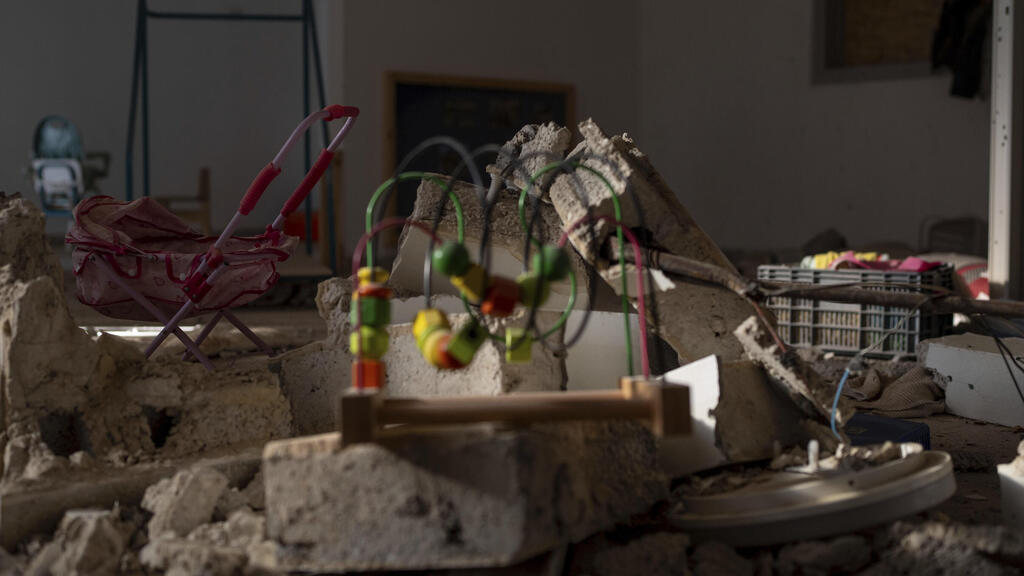Noam (not his real name), a father of three from northern Israel, experiences the war’s impact on his children daily. “Our oldest acts as if everything is normal, but she’s extremely tense and grappling with deep fears. Our middle child suffers from severe anxiety – at night, she curls up silently and cries, as if she wants to disappear. She’s terrified to be alone, even at home. Meanwhile, our youngest runs to the safe room at the slightest sound,” he shares.
“It’s a roller coaster,” he clarifies. “The root of the problem lies in the system’s inability to handle the situation. Nobody has taken the time to speak with educators about what their behavior during a missile alert means for the children, how to support a child dealing with anxiety, or the impact of overhearing adults discuss the crisis. Most of the challenges we face come from the fear instilled in children due to unprofessional handling. While we sought support from the educational psychology service on our own initiative, there’s been no proactive outreach, no guidance, no parental training. These are critical resources that simply don’t exist.”
Wearing his hat as a mental health expert, Noam predicts significant long-term consequences for the current situation. “Children are developing deep-seated anxieties, a lack of independence, difficulty in growth, low frustration tolerance, diminished self-esteem, social withdrawal, and nighttime bedwetting. This is the reality. There will be no true recovery. These kids, already struggling with deficits from the pandemic, are now facing yet another year of disruption. The emotional scars are growing, and there are no sufficient interventions,” he asserted.
A recent study led by Dr. Ortal Buchnik-Azil, in collaboration with Dr. Lilach Lev Ari and Dr. Maayan Shorer from the Ruppin Academic Center and Dr. Liat Helfman from the University of Haifa, highlights the emotional struggles of children and teens in northern Israel during the war. Conducted in spring 2024, the study surveyed 400 parents of children under 18, including both evacuees and those who remained in their homes.
“We anticipated that families uprooted from their natural environment or enduring constant rocket attacks would experience high-intensity stress, leading to significant psychological repercussions,” explains Buchnik-Azil, a faculty member at Ruppin Academic Center and a psychologist specializing in parent and child therapy. “Our goal was to amplify the voices of these families and shed light on a region receiving inadequate support.”
3 View gallery


"There's ups and downs." A father of three shares the children's distress
(Photo: Avihu Shapira)
The researchers identified a range of symptoms persisting among children since October 7, exacerbated by the war: anxiety attacks, temper tantrums, children reverting to sleeping with their parents, difficulty with separation, nightmares, and a constant fear that something bad will happen. “When parents exhibit high levels of anxiety and stress, their children mirror these emotions,” says Buchnik-Azil. “Many children are also exposed to distressing content through schools or peers. Some parents mistakenly think their children accidentally came across such information and opt to avoid addressing it, which only amplifies the symptoms.”
The lack of mediation by schools exacerbates the problem. “Schools don’t explain, contextualize or teach children how to process the situation, leaving them to construct their own narratives and deepen their trauma. Mediation is critical – when parents step up to articulate what’s happening, children’s symptoms significantly decrease.”
In northern Israel, the trauma is compounded, with families facing dual layers of stress and a profound sense of exhaustion.
“This isn’t just about families directly affected by terrorism, rocket impacts, or physical harm,” the researchers explain. “Simply living in the north, where alarms disrupt daily life, creates a high likelihood of depression and anxiety. With proper community and psychological support, most people can recover. The problem is that communities are disintegrating, support networks are absent, and there aren’t enough resources to help people recover and reduce symptoms.”
Nadav (not his real name), a father of three from Kiryat Shmona, intimately understands the impact of community collapse. “It’s losing every pillar of stability in your life – your home, your room, your bed and the familiar neighborhood, friends, youth movements, schools and activities. All of that disappeared overnight and was replaced by a makeshift existence: a hotel room, then one apartment, then another. There’s no stability, and my kids are afraid to form attachments because they know it’s all temporary. I see it in them – they don’t want to invest emotionally because they sense another transition is coming. It’s this constant tension.”
The academic setbacks that began during the pandemic are widening, Nadav notes. “At their regular school, we had resources like integration hours to address gaps. In the current framework, those resources aren’t available. I don’t know how these gaps, which feed into issues like self-confidence and life skills, will ever be closed. While we had better support during the hotel phase, once we moved out, those resources disappeared. The availability of services depends entirely on the specific staff at each school.”
Even discussions about returning home trigger mixed emotions. “My youngest is experiencing regressions, including temper tantrums we thought were behind her. These resurfaced in the last two weeks as talks of a cease-fire brought everything back to the surface. On one hand, it’s exciting to go back, but on the other, it raises so many fears. What will it be like? Will it be safe?”
Get the Ynetnews app on your smartphone: Google Play: https://bit.ly/4eJ37pE | Apple App Store: https://bit.ly/3ZL7iNv
The mental health system’s inability to meet demand was a pre-existing issue, especially in peripheral areas, and has worsened in the past year. The researchers emphasize the urgent need to expand psychological and emotional support for this population. “The situation in the north isn’t just a case of acute stress,” says Buchnik-Azil.
“It’s a chronic stress environment that erodes parents’ ability to regulate themselves and provide a stable foundation for their children. We see children growing up in fear, lacking tools for self-soothing, social skills, and academic focus," she explains. "A post-traumatic generation is emerging, marked by a loss of trust in systems and their ability to provide help. We call on the government to immediately allocate funds and resources to provide psychological support for parents and educational staff.”



